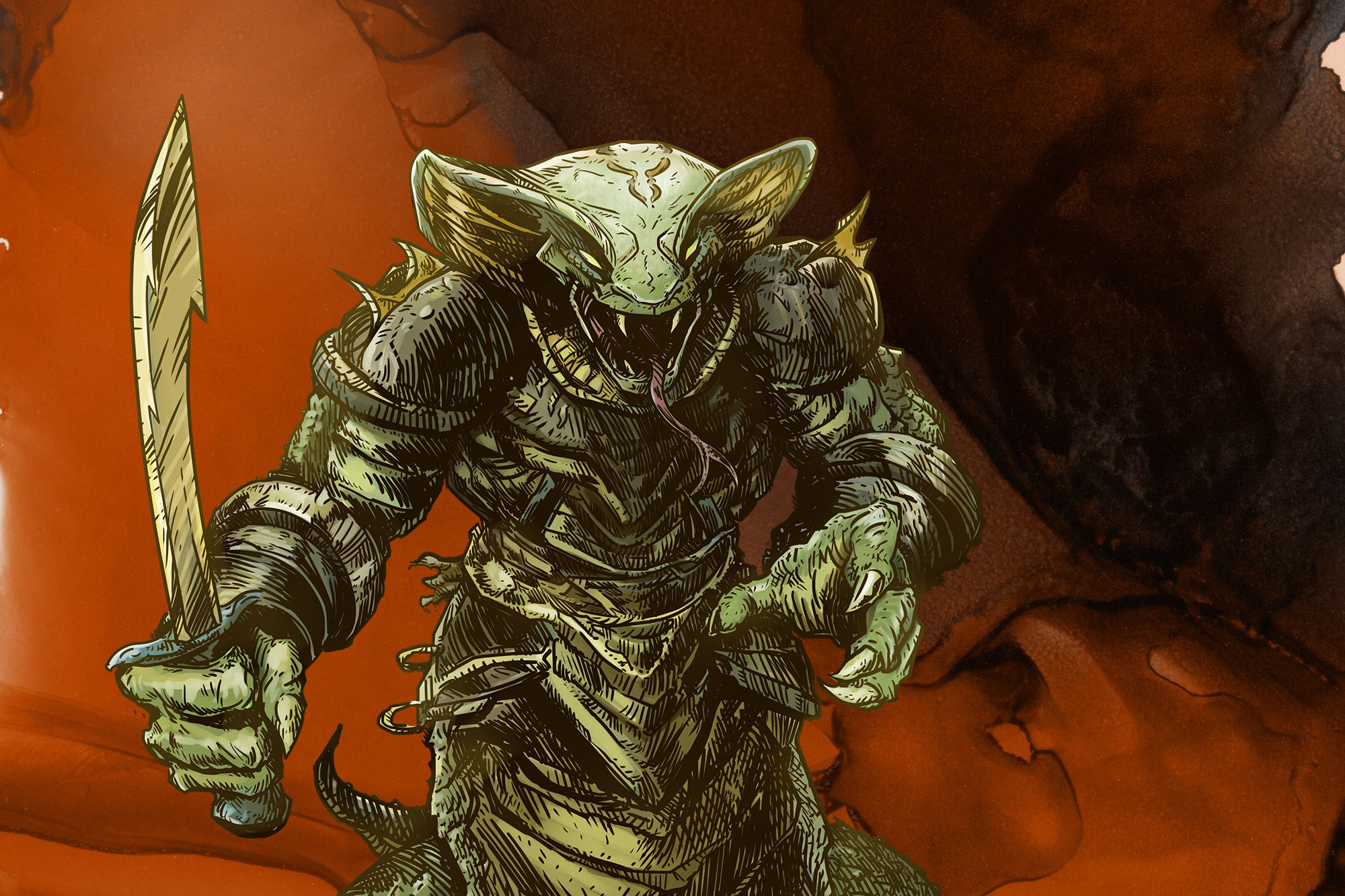
SESSION 47B: CHILDREN OF MRATHRACH
December 26th, 2009
The 25th Day of Kadal in the 790th Year of the Seyrunian Dynasty
Mahdoth rotated towards them. “I’m going to release you now.”
And he did.
The artificial high of ebullient friendship fled from them, but not the memory of what they had experienced.
Mahdoth asked for their assistance in mounting a defense against whatever was coming. “Since I seem to find myself rather short-handed this evening.”
They readily agreed. Elestra was still extremely paranoid (trying to figure out some way that Urak could think he had been suborned while Mahdoth was actually still calling the shots), but the others were quick to point out that he had released Agnarr, Tee, Tor, and Ranthir… even though he didn’t need to do that.
It turned out that the unused door Tee had spotted at the far end of the western cells actually led to the caverns. Mahdoth explained that an expansion of the asylum had broken into a section of the natural caverns beneath Ptolus. The caverns had never been properly explored, but when they became a perpetual source of random dangers, Mahdoth simply had them sealed off.
Mahdoth proposed that he would wait for the cultists upstairs while they kept a watch on the door down here. They thought that was a grand idea (particularly Elestra), and their only concern was the lack of any means of proper communication. To solve this problem, Ranthir went upstairs with Mahdoth to cast an alarm spell that Mahdoth could enter if he needed their help. Conversely, if they needed Mahdoth’s help it would be trivial for Elestra to send her homunculus up through the floor to fetch him.
Before they parted, Mahdoth grabbed the amulet that Urak had worn and gave it to Ranthir. It would allow him to punch through the suppression field with his spells.
UPSTAIRS WITH MAHDOTH
The minutes ticked past with tense expectation. They were drawing near the midnight hour—
Mahdoth floated through the door, carrying with him a statue depicting one of the goat-headed demons they had met in Pythoness House. They quickly realized that this was the only remnant of the battle that had been fought upstairs.
Mahdoth quickly related what had happened: When the knock came at the upper door, the beholder had opened it to discover the demon, two ratbrutes, and a dozen or so ratlings amassed outside. Leveling one of his eyestalks, he had instantly turned the demon into a statue. In the same moment, he had put one of the ratbrutes to sleep and disintegrated the other.
At the sight, the other ratlings had panicked and fled. He killed the ratbrute, plucked from its body a letter, and then dusted it. Then he grabbed the demon-statue and brought it downstairs.
Tor, upon hearing the story, bowed his head. “I apologize. We had absolutely no business trying to come in here and kill you.
“Yes,” Mahdoth said. “Quite.”
ILLADRAS’ PROMISSORY NOTE
Salcabot—
Your information regarding Silion’s last communion with the Black Voice is, indeed, most valuable. And your mercenary spirit in exploiting it is most commendable in the eyes of Wuntad.
To ensure that no disruption of this most important trade is to be suffered due to the recent and shameful disgraces of the Blooded Knife, Nalfarassik shall accompany you. He shall command the respect of the Children of Mrathrach.
But fear not. I witness the will of Wuntad, and this note shall serve as promissory to such effect, that if your information proves true and the trade continues unabated due to your efforts, we of the Tolling Bell shall support your claims to leadership among the Brothers of the Blooded Knife.
Illadras
As Tee finished reading the letter aloud, they took some private joy in learning that the Blooded Knife had been shamed. Then they turned their attention to the second fight that they knew was fast approaching the far side of the locked door before them.
Mahdoth offered them a final briefing: The cells in this block were laced with antimagic. Three of them were currently occupied. None of them should be disturbed.
“What about that passage?” Tee asked, pointing at the narrow way she had noticed before.
“Don’t go down there.”
THE CHILDREN OF MRATHRACH
A chaotic and seemingly senseless knock came at the door.
The spellcasters turned Tee invisible. Ranthir conjured an illusion of the demon answering the door, carefully choreographing it to match Mahdoth’s telekinetic opening of the same.
In the cavern beyond the door they saw a procession of serpent people. Eight of them bore four crates, four more stood guard upon them, and leading them was a larger creature of red eyes and black scales.
The black-scaled serpent hissed something in a sibilant tongue that none of them could understand. Everyone froze for a moment (except for Tee, who slipped quietly through the door).
When the demon failed to respond, it was clear that the serpents were becoming suspicious. Ranthir, realizing that the jig was already up, dropped a fireball into the midst of the serpent’s procession. Tee, who had worked her way into their midst, hit the deck and was narrowly missed by the flames rushing over her head. The serpent people around her, however, were not so lucky. The scent of burning flesh filled the air.
The black-scaled serpent turned to flee, but Mahdoth floated into view and blasted it repeatedly with a coruscating array of beams – the last of which caused it to explode in a fine mist of blood as it collapsed at the far end of the cavern.
As Mahdoth’s rays dropped away, Tor dashed through the door and finished off the rest of the serpent people still trying to reel away from the charcoaled remains of their brethren. Tee had scarcely had a chance to regain her feet and the fight was already over.
Amid the bodies they found a scroll of black parchment. Strange, twisted characters were written upon it in silver ink. Elestra reached out through the ancient knowledge held quiescent within the Spirit of the City and translated the script. And then she cried out in dismay.
BLACK PARCHMENT
Know that the barren serpent savages of the Teeth are not unknown unto the Children of Mrathrach.
Know that we will not deign to meet their kin.
Know that they are no kin to us.
Know that we disdain their foulness.
Know that we scorn the questioning of this “Wulvera” as to such a purpose.
Know that we act only by action of the Voice of All Chaos.
Know that the blood of the slave races must be paid.
Know that we do not forget our labor.
Know that we do not forget the great labor to be done.
The four crates, for better or for worse, remained largely undamaged by Ranthir’s fireball. At Tee’s direction, Agnarr began wrenching them open:
The first contained some sort of strange, semi-organic foam – as if some terrible living entity had grown to fill the box like a swollen tumor.
The second had a suit of plate armor that was heavily insulated with a silvery fabric. The exterior of the armor was filigreed with copper and a number of iron antennae – some large and some small – jutted out from it at odd, almost disturbing angles; jagging this way and that in a chaotic fashion.
The third contained several items – two pairs of manacles made of intricately etched brass attached to a similarly-etched oblong device by a long, rubbery cord; a cocoon-like container of silvery-black metal containing six small, oblong spheres of similar metal; and a large iron collar with five oblong nodules extruding from it in equidistant points along its circumference.
The fourth held sixteen canopic-like jars containing some sort of thick fluid; twelve fluted vials containing a thick, pinkish liquid; and four three-pronged syringes containing a bluish-silver liquid.
The contents were almost certainly chaositech and uniformly disturbing, and it was only at Tee’s great insistence that Agnarr peeled back the semi-organic foam in the first crate to reveal its true contents: A two-foot-long brain trailing a pair of long, spindly, tentacle-like arms ending in complex, grasping clamps. Once freed from the foam, the brain slowly floated up into the air before it was vigorously shoved back into its crate by the barbarian.
Tee turned from watching Agnarr trying to wrestle the brain back into its crate. To Mahdoth she said, “We know where we can dispose of these items safely.”
“Fine,” Mahdoth said. “Take them. I intend to seal this door and use better discretion in finding new help.”
He escorted them back up the stairs. “Two final points,” he said. “First, lock the door behind you. Second… if you are to cross paths with the Pactlords, be wary. They are larger and more dangerous than they appear. And now, good night. Apparently I must arise early to single-handedly attend to all the affairs of this asylum.”
“Well, if you’re in the market for new assistants…” Tee offered.
“The pay is 5 gold a week.”
“Or perhaps not.”
Running the Campaign: Fighting With Monsters – Campaign Journal: Session 47C
In the Shadow of the Spire: Index
















